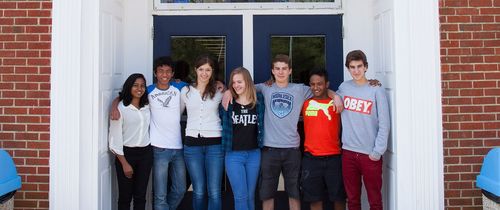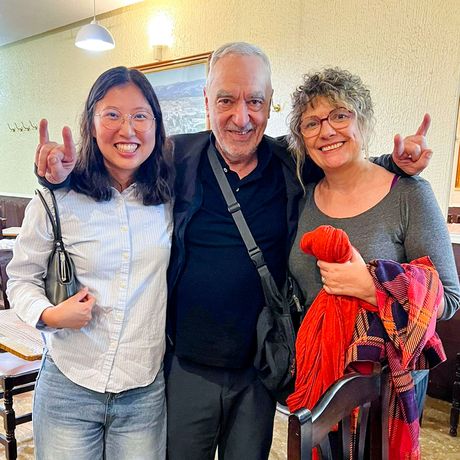
BridgeUSA Host Schools for Exchange Students
Welcome the world to your classroom

Discover How Cultural Exchange Can Transform Your School
Embrace the opportunity to become a host school with the CIEE BridgeUSA High School program. By welcoming international students, you’ll give your students something incredibly valuable – international awareness and exposure to other cultures and viewpoints.
Carefully screened visiting students get the chance to expand their English skills and learn about American culture. In return, the presence of an exchange student gives each lesson a new dimension that brings the material to life.
When you partner your school with America’s leader in cultural exchange, you build a stronger community within your walls and raise your profile outside of them. Join us.
Gold Standard Service: Support That Never Sleeps
Since 1947, CIEE has been connecting students with the world. We've learned that support throughout the program is critical not only for students, but also for host families, schools, and communities.

Compliance with the Department of State
Schools partnering with CIEE BridgeUSA can trust they're aligned with a 75-year industry leader that consistently meets rigorous Department of State (DOS) standards. Our proven expertise in cultural exchange ensures smooth program administration, full regulatory compliance, and meaningful experiences for both host institutions and exchange visitors.
- CIEE BridgeUSA support team: All staff are trained and certified in DOS BridgeUSA regulations, ensuring compliance and consistency across every level of support.
- Local coordinators: All LCs complete ongoing professional development and annual DOS-compliant training to uphold the highest standards of safety and program quality.
- Host families: Each placement meets strict DOS and CIEE certification standards, ensuring the well-being of every student and the integrity of every host partnership.

CIEE BridgeUSA Support Team
Should you or someone else at your school need support, you’ll first get in touch with your LC. CIEE BridgeUSA LCs are at the center of our program – in contact with students, host families, community leaders, and you.
Your next point of contact is the CIEE BridgeUSA support team:
- Between 9 a.m.-8 p.m. EST Monday-Friday, call 1-800-448-9944.
- For after-hours emergencies, call the same number, but follow the prompts for the emergency line.
- For general support, email support@ciee.org.
Expectations and Requirements
CIEE BridgeUSA has established program rules and recommendations for students about academic expectations, host family participation, and personal health and safety.
The qualifications of CIEE BridgeUSA High School participants include:
- A grade-point average (GPA) of 2.33 on a scale of 4.0 (C+) or better. Students must submit school transcripts for the current and three previous academic years.
- Completion of each school year with passing grades.
- Study of English in an academic environment for a minimum of three years. Students cannot have failed a year of English in the last three years at school.
- Ability to understand and speak English. Each participant is administered a Standard English Test before their application. The recommended test is the SLEP (Secondary Level English Proficiency) and a score of 38 or higher is required. CIEE also accepts the MET (Michigan English Test) with a score of 63 or higher.
Your school decides the appropriate grade level for each CIEE BridgeUSA participant. While many students leave their country expecting to be placed in a certain grade, your placement may not align with their expectations. We encourage you to work with your CIEE local coordinator (LC) and the student to establish the most appropriate grade level.
CIEE participants must achieve a C+ or higher in all classes while at your school.
If a student is struggling academically, it’s important for you to contact the host family, local coordinator (LC), or the CIEE Support Team to discuss concerns.
Once CIEE is aware of a problem, we can help our participant understand what’s expected of him or her, as well as provide resources to assist as needed.
Most exchange students go through an initial period of adjustment. During this time, students may struggle academically because of:
- Unfamiliar class structure and instructional style
- Adjustment to English and local accents
- Expectations about homework, class participation, and exams
Tutoring may be an option for exchange students who have ongoing difficulty or who are particularly challenged academically. CIEE values teacher and school recommendations about tutoring. If you have concerns about a student’s academics, contact your CIEE local coordinator (LC), who will work with the student and your school to find an appropriate tutor. Tutoring fees are the responsibility of CIEE students.
You can help by sharing your knowledge of local tutors and other after-school academic-assistance resources. This could make the difference in a student’s success and make his/her visit to the United States the life-changing experience it’s intended to be.
The decision of whether to award a diploma to eligible participants is yours as the host school. Your policies take precedence.
A student’s standing at their high school in his/her home country may be a factor in your decision.
Note: Students who have graduated from high school in their home country are not eligible for participation in the CIEE BridgeUSA High School program.
Some students must go through a process of convalidating their U.S. grades to receive credit for schoolwork done during this program. This requires an official transcript from your school and is the student’s responsibility. You only need to provide an official, sealed transcript on request.
There are steps students must follow to convalidate grades. The process is slightly different for each country, but it always involves obtaining an official school transcript and students contacting their regional consulate.
CIEE encourages all students – even from countries that do not require convalidation – to request an official transcript from their U.S. high school. If you have any questions about convalidation or if your students need assistance in this process, contact support@ciee.org.
CIEE strongly recommends that participants get involved in sports and/or extracurricular activities at school.
Some already know what they’d like to do. Others need help finding out what’s available. Help students choose an activity that’s right for them. Encourage them to take part in events like homecoming and prom. All this will contribute to richer experiences and memories.
Non-grant program CIEE BridgeUSA High School students who hold J-1 visas also are required to volunteer eight hours per semester in community service projects. Students are invited to create their own project, one suitable for the school environment. Examples include:
- Giving a workshop about their home country
- Teaching their native language to others
- Setting up and cleaning up at school events
- Organizing charity drives and fundraisers
If the student’s project is held under your school’s auspices, you’ll be asked to provide a supervisor who can evaluate the student’s involvement. The student also will write an essay about the experience.
Your CIEE local coordinator (LC) can tell you more about the community-service project and how it can benefit your school.
To participate in the CIEE BridgeUSA High School program, all students must sign the CIEE vaccination agreement included in their application materials and receive all vaccinations listed on the form. Any student who arrives in the United States without one or more of the necessary vaccinations will be required to obtain the vaccination(s) before starting school.
Vaccinations and their costs are not the responsibility of the host school. Obtaining and paying for vaccinations is up to the student’s own family.
Frequently Asked Questions (FAQs)
Various types of high schools have become host schools for international students; including public, private, and charter schools.
A member of the CIEE BridgeUSA High School team can answer these questions once you’re in touch with us.
Working with a trusted, longtime sponsor like CIEE is the best way to begin your journey of bringing the BridgeUSA High School program to your institution. CIEE is the largest and oldest sponsor organization in the U.S., helping many students come to the country each year to live, learn, and travel.
Contact Us

Making America safer, stronger, and more prosperous.
Created by Congress in 1961, BridgeUSA builds bridges between nations by bringing more than 300,000 young leaders each year to live, work, and learn in the United States through transformational cultural and professional exchanges. As the largest and longest-serving BridgeUSA sponsor, CIEE helps make these experiences possible – welcoming over 30,000 participants annually who strengthen American businesses, enrich communities, and share their cultures and ideas, making America safer, stronger, and more prosperous.
Learn more about BridgeUSA